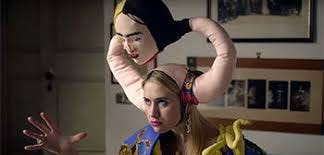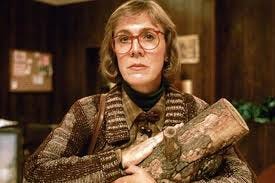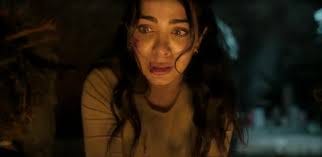Capri Panting
My thoughts on Another Simple Favor, Electra, I Know Catherine, The Log Lady and Rosario
Although only a modest success in theaters when it was released in 2018, the diabolical comedy-thriiller A Simple Favor went on to find a large and appreciative audience via streaming and now, hoping for lightning to strike twice, Amazon offers up Another Simple Favor. Picking up a few years after the events of its predecessor (which are far too convoluted to adequately sum up here), we learn that Connecticut mom-turned-crime-solver Stephanie (Anna Kendrick) has written a book on said events that is not selling particularly well. While on a book tour to help goose those sales, she is unexpectedly visited by none other than Emily (Blake Lively), the glamorous and mysterious psychopath who was the center of it all, and discovers that not only has her former frenemy been mysteriously released from prison but is also about to marry hunky Italian Dante (Michele Morrone) and wants Stephanie to serve as her maid of honor. Although she suspects that she is being set up for something, Stephanie realizes that if she does the sensible thing and decline, there is no movie and so she jets off to the impossibly glamorous isle of Capri, where she discovers that Dante is the son of a powerful mob boss (Elena Sofia Ricci) and that the guest list also includes Emily’s former husband (and Stephanie’s former lover) Sean (Henry Golding) and her long-estranged mother (Elizabeth Perkins, taking over for Jean Smart) and heretofore-unknown aunt (Allison Janney) and members of a rival mob family. Without going into much more detail, I will say that before long, people start turning up dead and Stephanie is inevitably accused of the crimes and she has to use her deductive skills to try to puzzle out who is setting her up, with any number of long-buried secrets along the way.
I was an enormous fan of the original A Simple Favor—I even had it on my 10 Best Films list for that year—but when I heard that a sequel was happening, I wasn’t sure how such a thing could quite work, even with the return of the two leads and director Paul Feig, and as it turns out, it doesn’t. While the first one managed to manage to blend together hilariously bitchy comedy and cheerfully demented plot twists in a manner not seen since the glorious cult favorite The Last of Sheila (1973), screenwriters Jessica Sharzer and Laeta Kalogridis have not been able to thread that particular needle in an equally satisfying manner here, instead giving us an increasingly overlong and slipshod narrative that seems more concerned with giving the actors the chance to have a presumably well-paid working vacations and putting Lively in a series of increasingly wild outfits than in giving them a story that makes much sense or is particularly interesting. There is an effort to one-up the demented plot developments of the previous films with a number of eyebrow-raising twists that skirt way past the bounds of anything resembling good taste and while I wouldn’t say that I was particularly offended by any of them, the sheer effort that the film undergoes in order to top what came before proves to be more exhausting than amusing. As was the case with the original, the best thing about Another Simple Favor is the amusingly bitchy byplay and crack comic chemistry between the two leads, though it might have been better if they had elected to deploy it in the service of a new project rather than to simply rehash past glories as they do here
.Electra, the debut feature from director Hala Matar, kicks off with journalist Dylan (Daryl Wein) turning up in Rome with his girlfriend Lucy (Abigail Cowan) in the hopes of landing an interview with Milo (Jack Farthing), a rich, famous and notoriously womanizing rock star whose career has hit a rough patch as of late. During initial talks and then at dinner, a rapport develops between them that is further strengthen by the arrival of Francesca (Maria Bakalova), an up-and-coming performance artist who is looking for her own piece of the spotlight, leading to Milo and Francesca inviting Dylan and Lucy to spend the weekend with them at a lavish country estate, where they will conduct the interview and do who knows what else. However, as soon as they arrive at the estate—which is roughly the size of Citizen Kane’s Xanadu—it soon becomes apparent that all is not as it seems and at this point, I will pretty much bow out at this point in terms of plot revelations, except to mention that a number of the subsequent intrigues revolve around a painting of a unicorn done by a mysterious painter that is supposed to be indescribably valuable.
Co-written by Matar, Wein and Paul Sada, Electra is essentially cobbled together out of bits and pieces from any number of past films, including La Piscine, Performance, The Talented Mr. Ripely, Swimming Pool and Saltburn. However, while Matar clearly knows the kind of film that she is trying to make her, she stumbles when it comes to making one that can stand on its own. Although the early scenes setting up the premise have a certain intrigue, once the scene shifts to the estate, things start going off the rails because the narrative requires you to buy an awful lot of implausibilities in order to keep it moving along and by the end, it ends up devolving into complete nonsense. Matar also struggles with the tone at times as the film lurches between straightforward intrigue and overdone cartoonishess, including a number of trippy psychedelic visuals that are more distracting than edifying. The one element that does unquestionably work is the performance by Bakalova, who takes a character who could have simply been treated as a one-note joke and lends it the kind of unpredictable energy that suggests that the film could potentially go off in any number of unique directions, even if it ultimately doesn’t. There are other moments that work here and there but while Electra has been made with a certain undeniable style, I would have gladly traded some of that in for something closer to an actual point
.Richard Green’s documentary I Know Catherine, the Log Lady recounts the life story of Catherine Coulson, who became a cult icon to many for her appearances on David Lynch’s Twin Peaks as the Log Lady, the mysterious character who more or less embodied the weirdness of that groundbreaking show. Some of you may think that this might be a fairly slender branch upon which to hang an entire film but as the documentary shows, she had a fascinating and monumental life outside of her work with longtime friend Lynch, with whomp she first worked on the long and arduous production of his debut feature Eraserhead. (At the time, she was married to that film’s star, Jack Nance.) Through interviews with a number of family members, friends and colleagues (including Lynch himself, whose appearances now add an extra level of poignancy to the proceedings), we learn about the details of both her personal life and her career as both an actress and as a camera technician on films such as Star Trek II: The Wrath of Khan. Although the film runs a little too long—you get the sense that Green wanted to cram in as much material as he could—it does snap into bracing focus during an extended and moving final segment covering her diagnosis of the cancer that would eventually kill her in 2015 and the efforts that went into filming, just a few days before her passing, her brief but haunting appearance in Twin Peaks: The Return. For fans of the show, I Know Catherine, the Log Lady is a must, of course, but even if you have never seen Twin Peaks before, it still works as an engaging, if occasionally rambling, portrait of a woman who lived a truly strange and extraordinary life
.When we first see the title character of the new horror thriller Rosario, it is during a 1999-set prologue in which she is celebrating her 12th birthday party with her large Mexican family, including grandmother Griselda (Constanta Gutierrez), whose mumbling and odd behavior scares the girl. When the story picks up 25 years later, Rosario (Emeraude Toubia) is now a successful stockbroker who appears to estranged from everyone in her family aside from her father (Jose Zuniga), whom she sided with following his divorce from her mother. Nevertheless, when she receives a call informing her that Griselda has died, she agrees to go to her apartment to stay with the body until the paramedics can arrive. Alas, when she arrives at the dilapidated building—a place so creepy that the neighbor across the hall is played by none other than David Dastmalchian—she discovers that due to a blizzard raging outside, it will be quite a while before an ambulance can come. Things take an additional turn for the worse when she makes a series of discoveries that suggest that her grandmother may have been up to some extremely bad stuff of a supernatural nature targeting her and she now has to figure out how to undo it all before the evil that is clearly inside the apartment can claim her.
Marking the directorial debut of Felipe Vargas, Rosario is a mixed bag of a horror thriller that has a number of elements that are genuinely effective with ones that just go nowhere. On the plus side, the production design of the apartment in which the majority of the narrative set is so undeniably creepy that after you get a load of the supremely grungy surroundings, the more overtly supernatural aspects more or less pale by comparison when they eventually arrive. That said, those effects are presented in a convincing manner that seems to favor practical visuals over CGI silliness. On the non-technical side, the film is anchored by a quietly strong performance from Toubia in the title role and ably supported by Dastmalchian, who essentially serves as a red herring and is clearly having a lot of fun with the role, despite not really having much of anything to do. The problem is that the screenplay from Alan Trezza is just too reminiscent of both any number of previous possession films as well as plenty of single-setting horror tales as well—so much so that we can pretty much see every single twist and turn long before they are deployed—and there are points where the conceits required to get from one plot point to the next (such as Rosario being able to figure out all the petinent details regarding her grandmother’s weird, ancient rituals with a brief Google search) become ludicrous. Rosario has been made with more style than many of the horror movies that have come down the pike of later and it is just good enough to make me curious to see what Vargas does next but unless you are a complete newcomer to the genre, you have almost certainly seen everything that it has to offer done both before and better than what is presented here.







